Graham Reid | | 8 min read
The Flaming Lips: All We Have is Now (from Yoshimi Battles the Pink Robots)
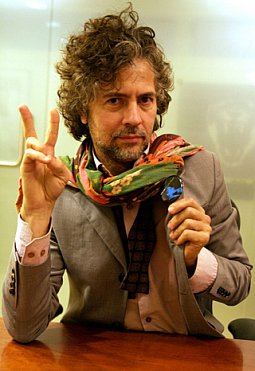
Wayne Coyne of the Flaming Lips is in his kitchen in Oklahoma City saying he likes that rock'n'roll is a broad church. It allows alternative music to co-exist with MTV and pop radio.
"I don't want the world to be just made up of music like the Flaming Lips, White Stripes and Yeah Yeah Yeahs. I like that rock'n'roll is an uncontrollable beast throwing away great artists and celebrating some not so great artists. I like that it's unpredictable and dangerous."
Then as an afterthought: "Music allows you to be who you want. Rock'n'roll has made Michael Jackson what he is today."
But as he enjoys the quip the kitchen suddenly explodes with noise as half a dozen alarm clocks go off simultaneously.
Now he's shouting above the racket: "The first one has frogs from all around the world doing their recorded croaks, then there's the locomotive trains and the Christmas songs one, then another is the sound of cats.
"So as I go to point out how weird Michael Jackson is I'm sitting here with all these in my kitchen," he laughs.
Coyne -- polite, thoughtful, garrulous and good-humoured -- has been considering the Flaming Lips' place in rock, and their wobbly career which has seen them go from local clubs to opening for long-forgotten grunge act Candlebox then upward to backing Beck and having Justin Timberlake appear on stage with them in a bunny suit.
Flaming Lips, formed as an alt.punk band 20 years ago and with only one major single to their name -- the gimmick hit She Don't Use Jelly in 94 which Beavis and Butthead broke for them -- are currently the coolest band on the planet. They are a fun-loving neo-psychedelic rock band with a mainline to existential beauty wrapped in delicate pop, and an ear to experimentation.
Coyne -- greying at the temples and with a mischievous grin -- went into their record company six years ago and presented their Zaireeka concept, four discs designed to be played simultaneously. His other projects have included The Parking Lot Experiments, an orchestra of 40 cars with their tape decks playing specially composed music.
But the Flaming Lips have also appeared as the bar band in the teen telly show Charmed and a few years back lip-synched a similar role on Beverly Hills 90210 which drew the character Steve Sanders (actor Ian Ziering) to utter those deathless words: "You know, I've never been a big fan of alternative music, but these guys rocked the house".
Today, the Flaming Lips are less often rocking than seducing. They broke through with the symphonic psychedelia of their '99 album The Soft Bulletin and the follow-up, Yoshimi Battles the Pink Robots, was widely considered one of the best albums of 2002. They had found their voice and it was melodic, mysterious and memorable.
 One track on Yoshimi, with the typically Lips-ean title Approaching Pavonis Mons by Balloon, won a Grammy for best instrumental last year and their recently released EP, Flight Test (seven non-Yoshimi tracks and covers of Beck, Radiohead and Kylie Minogue's Can't Get You Out of My Head), is nominated in the alternative album category.
One track on Yoshimi, with the typically Lips-ean title Approaching Pavonis Mons by Balloon, won a Grammy for best instrumental last year and their recently released EP, Flight Test (seven non-Yoshimi tracks and covers of Beck, Radiohead and Kylie Minogue's Can't Get You Out of My Head), is nominated in the alternative album category.
"How absurd can that be?" Coyne chuckles. "I hope we don't win because we're up against Radiohead and the White Stripes who've made great records. It would be silly to win with a record that's not even a full record and not something we worked that hard on. But it's still an honour to be included in these mainstream commercial things."
This whip-smart Wizard of Oz behind the almost scrupulously uncommercial Flaming Lips is the second youngest of six children who grew up middle-class Catholics in the Baptist-belt of Oklahoma.
"When we were young, if someone offered us a hip loft in New York City or some underground practice space in Los Angeles we'd have jumped, but no one did. But music isn't made in a place, it's made in your mind and that can be anywhere.
"In 84 we started touring and realised it was an asset to be from Oklahoma. People thought it strange and it added to the uniqueness we were looking for. There it was, something we didn't even come up with."
Coyne formed the Flaming Lips with his brother Mark and bassist Michael Ivins and, in a story worthy of Behind the Music or Fleetwood Mac's revolving-door membership, musicians have come and gone with only Ivins and Coyne being constants. Jonathan Donahue was in the ranks but quit to form Mercury Rev.
Surprisingly, given their haphazard career, the Flaming Lips have been signed to Warners for more than a decade, brought in by veteran power-player Roberta Peterson who previously signed Van Halen, Devo, Dire Straits and Jane's Addiction. She had been taken by their indie albums Telepathic Surgery and In a Priest Driven Ambulance , and a stage act which featured bubbles, smoke and twinkling Christmas lights.
These days they perform their often melancholy songs with dancers in furry animal suits and home-made films as a backdrop. This answers Frank Zappa's question: does humour belong in music?
"Who wants to be around people with no sense of humour? You can be serious and funny and silly and sad - a big range - and that's the only way to truly communicate with people. If you're singing about human things and your audience is human you should be able to hit the mark at least once or twice, right?
"It's not that we sat and thought this up, it just evolved. After The Soft Bulletin we realised a lot of the songs were about death and we thought you can only sing so many songs about death before people start leaving and go off to kill themselves. We want people to have a good time so we've ended up a band that sings Happy Birthday but it's like [singing] 'Happy birthday to you, too bad you're gonna die'.
"But anybody with a mature outlook realises life is short so we might as well enjoy the best we can while we're here. That doesn't mean be a reckless irresponsible fool but to say, 'Let's enjoy our friends, and the good and bad things'."
However, they exist in a music culture where people take themselves exceptionally seriously. Coyne hopes their success allows others to see different ways of presenting themselves other than as egotistical, one-dimensional rock stars. Their lack of concern about what is cool has afforded them diverse opportunities (a track in Batman III, Lollapalooza dates in '94, and those sitcom appearances) others would shun.
"We've never had this strict path of what would be good to do. We've always just thought, 'This could be fun or different, let's try it'. Like playing on Beverly Hills 90210, you could think, 'People might say that's not cool'. Luckily, we've never cared about that - and those are the things that work out best."
When they opened for Tool in '93 the hard rock audience jeered them, "but now we meet people who say, 'I saw you with Tool and now you guys are my favourite band'. So you never know where your audience is going to come from.
"If you don't take chances you'll just always be playing to a small group of people you think you deserve."
That a band which now makes music as ethereal and cosmic as Yoshimi were once thrashy and inept garage-rockers is no surprise. Their title of a compilation of early material Finally the Punk Rockers Are Taking Acid is telling. They always looked to blend punk DIY attitude with open-minded musical ambition.
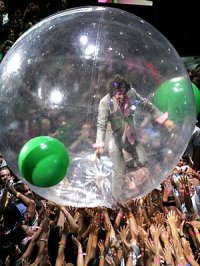 "We weren't skilled back then, we always wanted to be more beautiful but at the same time totally embraced the more noisy, freaky elements of rock'n'roll. The bands we admired were the Butthole Surfers, Husker Du and Black Flag but we also never stopped liking bands like the Beatles, Led Zeppelin or even Echo and the Bunnymen - things based on the more psychological melodies and colourings.
"We weren't skilled back then, we always wanted to be more beautiful but at the same time totally embraced the more noisy, freaky elements of rock'n'roll. The bands we admired were the Butthole Surfers, Husker Du and Black Flag but we also never stopped liking bands like the Beatles, Led Zeppelin or even Echo and the Bunnymen - things based on the more psychological melodies and colourings.
"We never threw away our influences and as we've gone on we're better at making records and better at having those ambiguous, expressionistic things you can only do with complicated music."
Coyne concedes that taking a complicated concept like Zaireeka to a major label could be suicidal but Warners have been supportive and recognise their experimental approach often has commercial pay-offs like The Soft Bulletin and Yoshimi.
"The record company follows what we do with enthusiasm. When I did the first Parking Lot Experiment there were two people from Warners doing it with us, so by the time I came around with Zaireeka they loved the ideas. The thing they like is we don't say, 'We're going to put out four CDs and it should be on the cover of Rolling Stone'. We know it's not a record for everybody. But you never know where experimentation is going to lead.
"On The Soft Bulletin we stretched the boundaries of what we expected of ourselves, and marvellous things come out of people believing in each other. I think we're a great example of that."
Coyne expected The Soft Bulletin to be their last album and alienate whatever small audience they had acquired, "but who knows what the world is going to want? It was embraced by people who hadn't considered us before. They heard something they could relate to. We really thought it would be our great achievement but so weird no one would give a shit about us any more".
Now - after two decades of experimentation and being casually uncool - they have a serious career. So what is Coyne going to do with it? Why, get into movies of course.
He hopes this year he can complete his Christmas on Mars movie which was delayed when Yoshimi took off and obliged them to tour for 18 months. He outlines the loose plot: an alien superbeing played by himself arrives in a dying human colony on Mars as Santa is killing himself, and there's a mix-up.
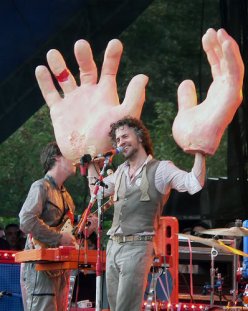 "There's a lot of scope. I'm not scripting per se because I don't know who is going to be in it yet. If Elijah Wood shows up next week and says, 'I've got a free weekend and want to be in your movie', then I'd write a part for him. And last week I stopped at this Mars simulator space station in the middle of the Utah desert and Nasa has given me permission to use it if I want.
"There's a lot of scope. I'm not scripting per se because I don't know who is going to be in it yet. If Elijah Wood shows up next week and says, 'I've got a free weekend and want to be in your movie', then I'd write a part for him. And last week I stopped at this Mars simulator space station in the middle of the Utah desert and Nasa has given me permission to use it if I want.
"So here I am with Elijah Wood and Nasa giving me options! So luckily I don't have it written in stone."
Coyne laughs again and says this is how he likes to work - projects which feed each other just as Zaireeka and The Parking Lot Experiments fed The Soft Bulletin and Yoshimi.
"We're hoping we can build yet another phase and dimension of stuff we do, and by doing a movie hopefully some great ideas for songs and directions in sound will come along and our next album will be the better for that."

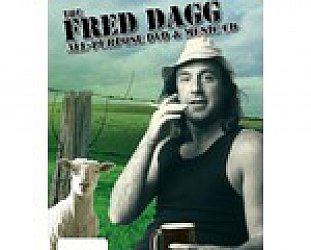


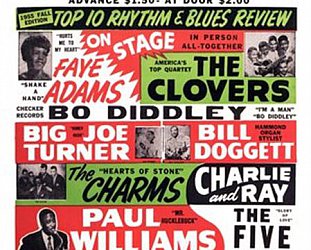

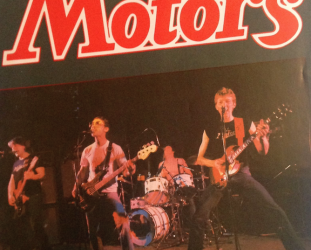
post a comment